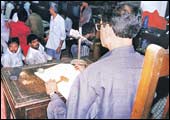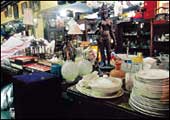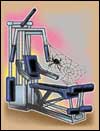 |
| Under the hammer: An auction in progress
at Russel Exchange |
 |
| Sunday jumble: Wares on display at Russel's |
Chippendale
yesterday; chowmein today. The fall from the sublime to the ridiculous
sums up Sumit Basu's Sundays. Until just the other Sunday, Basu,
the head of administration at Citibank's Kolkata operations would
drop in at Staynor, the 110-year old auctioneer on Kolkata's Free
School Street, for the weekly auction. An antique furniture aficionado,
there have been occasions when Basu has returned with a Chippendale
sideboard-as authentic as a Chippendale can be at an auction in
Kolkata, and for a mere Rs 5,000. But Basu will have to find something
else to do with his Sundays. Staynor, which once traded in Sheraton
desks, Italian marble busts, even Baccarat decanters, has downed
its shutters. In its place stands a Chinese dive.
It isn't just Staynor; Victor Brothers, once
the place where the city's smart set shopped for anything from furniture
to Lalique vases to tasteful bric-a-brac has a large 'For Sale'
sign in front. The redoubtable Gloria Walker, still sprightly for
her 60 years, is ready to sell out, a possibility that would have
made the front pages of the city's papers in Victor Brothers' glory-days
when Walkers' mother Josephine Dewity Mehra presided over Sunday
auctions with the kind of grace that can only be found during Tea
at the Ritz. "Like the races, auctions were a place to be seen,"
reminisces Walker. "Every Sunday the crème de la crème
of Kolkata would come to Victor to bid for a painting by Daniellei
or a Steinway piano." It's been some comedown since: Victor
Brothers' interiors are dusty; the 2,000-square feet space is stocked
with some furniture of indeterminate origin; and Walker conducts
her business from an office that boasts an ancient wooden swivel
chair and a green-baize topped table. The only incongruous note
is a computer.
LIVE AUCTION
A few gardens have started selling directly
to customers, but the tea-auction has lost none of its zing.
|
 |
| Nilhat House: Despite booming direct
sales, the tea auction lives on |
Every Tuesday, at a little before
nine in the morning, a group of men, and the occasional woman,
step into a long oak-panelled room at Nilhat House in Kolkata,
home to one of India's leading tea auctioneers, J. Thomas &
Company. On display are several bags with labels such as Singthom,
RamNugger, and Buxa. At 9.00 a.m, an auctioneer from J. Thomas
(he'll sport a company tie) or from rival auctioneer Caritt
Moran & Co walks in and bangs his gavel on the table-and
so begins the world's largest tea auction. For the next three
hours garden-owners watch brokers, exporters, and corporates
like HLL, Nestle, and Tata Tea, fight it out for the precious
leaves. The bidders are experts: they know that a kilogram of
Darjeeling Jung Pana 2 will cost anything between Rs 1,800 and
Rs 2,300, not less, not more. And that a kilogram of Hathimara
Buxa will not cost more than Rs 40. A few gardens are staying
away from auctions. "None of the Steinthal produce is sold
through auctions," says Mohan Chirimar, the owner of the
Steinthal and Singthom gardens in Darjeeling. Nor is any of
the produce of renowned gardens such as Makaibari, Ambootia,
and Lingia. The reason? Direct deals fetch better prices. Ambootia,
for instance, is happy dealing directly with Harrod's. "It's
far more profitable," explains owner Sanjay Bansal. Still,
the number of gardens eschewing auctions is small. And a tradition
lives on. |
Walker's brother David Mehra believes auctioning
is dead. He sells directly to interested customers. Not too long
ago, people would drop by at Victor Brothers on Sundays; the Chinese
vases may not have been Ming, but they were at least a couple of
centuries old. "There were rivalries too," says Mehra.
"The Rays of Bhowanipore would give anything to outbid the
Mullicks of Chorbagan, and either way, we made money."
The few auction houses that have survived have
changed with the times. Dalhousie Exchange's Soumitro Basu trades
in anything. "My father used to source rare antiques,"
he says, "but I am happy with what I get-even doors and windows
will do."
A Death Pre-ordained
Kolkata's auction industry was ordained to
die. "Some rich Parsi, Bengali, and Armenian families had seen
auctions in the west and wanted to replicate the model here,"
says Mohammed Salim, who owns auction house Russel Exchange. "But
with the decline of the Raj, their fortunes waned." And atrophy
set in. Salim bought Russel Exchange in 1981 from one such Armenian,
Gary Arathoon. His strategy may not find favour with the purists,
but it works: go to a client's house, pick up all the disposable
stuff, and hold a jumble sale on Sunday. "Most people who buy
furniture are looking to recycle the wood," says Dalhousie
Exchange's Basu, explaining why old door and window frames are in
demand. On a good day, an auctioneer can expect to sell goods worth
Rs 5 lakh (it earns a 10 per cent commission on this). In 1970,
says Mehra, "The Maharajah of Cossimbazar's lot generated revenues
of Rs 17 lakh in one day."
 |
| Faded glory: Once auction house Staynor,
now a Chinese joint |
Tapan Mitra, the Chairman of the West Bengal
State Planning Board, and an avowed auction freak, isn't surprised
by the decline of the auction culture. "Today's pace of life
does not allow anyone to waste time at auctions." And those
who can afford the time, don't have the money to sustain the trade.
Ergo, people who once believed auctions would maximise returns on
the sale of their furniture, jewellery, or prized artifacts, have
started looking elsewhere. "The yield from auctions is much
lower and the process is time-consuming," complains Ranjan
Deb, a city-based lawyer who comes from the Sovabazar Raj family,
once considered the first-among-equals in Kolkata's social hierarchy.
"It is better to go in for a negotiated sale," adds Deb,
whose extended family has sold, directly to buyers, a range of collectibles
from rare oils on canvas to cameos from the House of Aspreys, London.
That's true of other Kolkata blue-bloods too: recently, when the
Rs 3.5-crore Tanksalwalla collection was put on the block, it wasn't
through a city-based auction house: the venue was a five-star hotel
in Mumbai and the auctioneer was Dolly Thakore, a celebrity emcee.
"There are people ready to pay a price for our heirlooms, and
they are collectors who do not visit auctions," says Deb.
The Kolkata auction industry has also been
hit by a supply-side constraint: there are few old bungalows in
the city with the kind of furniture and bric-a-brac that made Victor
Brothers and Staynor a connossieurs' delight in the past. Dalhousie's
Basu confesses that the business is all about "trading in commodities,
not selling a piece of history", but is convinced that it does
have a future. "There will always be embassies with odds and
ends to sell." Walker and Mehra think otherwise, and are waiting
for someone with enough money to buy 4,500-square feet of space
on Kolkata's Park Street where Victor Brothers is located. These
Sundays Citibank's Sumit Basu has to countenance his father, a former
chief accountant at Burmah Shell, telling him about the good old
days, when he would wear his grey suit, drive down to Victor Brothers
in a Hillman, and bid for a Wedgwood lamp.
|
TREADMILL
|
 Choosing
The Right Gym Choosing
The Right Gym
A
fter operating his gym for three years, the owner of the
gym I've been religiously going to (okay, not so religiously
perhaps) suddenly decided last fortnight to shut it down because
of "an unavoidable circumstance". That, I probed
and found, was an innate desire to turn the gym into a warehouse
for his other business-manufacturing electric lamps. My gym
wasn't a swank, state-of-the-art place. In fact, it was more
like a dump, albeit a functioning one. It had a reasonable
number of training equipment that worked, a couple of trainers
who knew a bit about gymming and was open from six in the
morning to nine at night. But it wasn't the best you could
get. The prime reason for it was that the owner wasn't serious
about it. But you probably guessed that already from the alacrity
with which he switched it to a warehouse.
If you're wondering why I'm babbling about my erstwhile
gym, which is now a godown probably full of lamps and tubelights
and what have you, it is because choosing the right gym is
the first and most important task in beginning a serious exercise
regime. Here's my way of looking for a gym:
First, check out the owner. If he looks physically unfit-the
kind that has never got on a treadmill-then just forget it.
He may turn it into a high-calorie fast food joint. Or, just
not be interested in maintaining it well. A badly-maintained
gym can cause injuries and, moreover, be a disincentive to
going there regularly.
Next on your checklist is a close hard look at the equipment.
If a gym is stacked with cheap treadmills, rusty dumb-bells,
and rickety benches, just flee. Check also whether the gym
has enough treadmills and other cardio-vascular exercise equipment;
you wouldn't like to queue up for a session.
Ventilation and proper air-conditioning are important and
many gyms especially the ones that are sprouting up in urban
basements skimp on those. It's unhealthy to exercise in a
stuffy, poorly ventilated room.
And it's unsafe to use gyms where there aren't experienced
trainers or spotters. Check the credentials of the hunk who's
passing himself off as the gym instructor or trainer. Does
he have professional qualifications? How many years has he
been on the job? Does he understand your needs, goals, etc?
To be sure, good trainers are more important than flashy décor
and expensive new equipment.
Last but not least, look for a gym that is close to your
home or office. There's no point in being a member of a gym
if it's too far to go to.
-MUSCLES MANI
|
|

